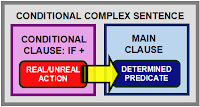 |
| Complex sentences in Grammar |
Constant use of short sentences can be a bit strange to read.
To make your writing more interesting, you can use two other sorts of longer sentences. Factsheet 1 looked at 'compound' sentences. This factsheet looks at 'complex' sentence.
How do I make a complex sentence?
When you make a compound sentence (see factsheet 1) you are joining two or more simple sentences together with a conjunction. If you took the conjunction away, the sentences would be complete and they would still make sense.
e.g. 'I hate curry, but I like Thai food.'= 'I hate curry' + but + 'I like Thai food'
This isn't the same for complex sentences. Complex sentences don't just divide into neat, complete, simple sentences if you take out the conjunctions. In complex sentences the conjunction is used to join together clauses. A clause is a group of words that contains a subject and a verb. Some of these clauses might be complete short sentences, but in a complex sentence at least one of them will depend on the conjunction for its meaning.
In other words, if you take the conjunction away, the sentence won't divide into complete units that make sense by themselves.
e.g. 'The dinner was burned because she had forgotten it.'
= 'The dinner was burned' + 'because' + 'she had forgotten it.'
This is a complex sentence:
* 'The dinner was burned' = complete, short sentence
* 'because' = conjunction (joining word)
* 'she had forgotten it' = subordinate clause. This doesn't make sense on its own. What had she forgotten? This is called a 'subordinate clause' because without the rest of the sentence it doesn't really make sense.
'Although I'm not very good, I really enjoy playing football.'
= 'Although' + 'I'm not very good' + 'I really enjoy playing football.'
Again, this is a complex sentence:
* 'Although' = conjunction (joining word). Yes, sometimes conjunctions can appear at the beginning of a sentence!
* 'I'm not very good' = subordinate clause. This doesn't make sense on its own. What are you not very good at? This is called a 'subordinate clause' because without the rest of the sentence it doesn't really make sense.
* 'I enjoy playing football' = complete short sentence

Aucun commentaire:
Enregistrer un commentaire